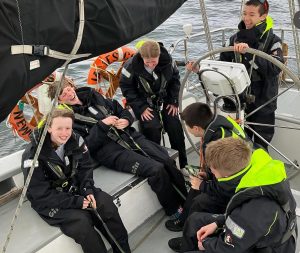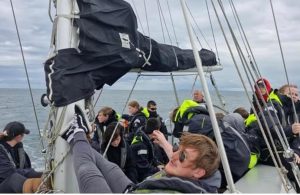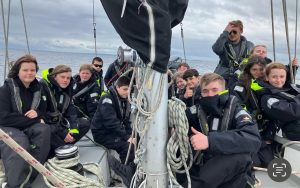In May 2025, a group of Sea Cadets from Hebburn Sea Cadets and RMCD embarked on a week-long voyage along the rugged Northeast coastline aboard a training vessel operated by the Ocean Youth Trust called the James Cook. The expedition was funded by the Ulysses Trust. This was not just a journey across the sea; it was a deep dive into teamwork, resilience, and practical seamanship under real-world conditions.
For many cadets, this was their first experience of living and working at sea. The voyage presented a series of physical and mental challenges: cramped sleeping quarters, unpredictable weather patterns, and the demand for constant co-operation in a confined space. Yet, despite the rigours, the experience quickly transformed from daunting to empowering.
During the expedition, cadets learned how to read nautical charts, plot routes, and use navigational instruments to steer through changing tides and shipping lanes. They took shifts on watch, learned rope work, and were tasked with keeping the vessel running smoothly—a responsibility typically left to seasoned sailors.
Cadet I said,
“On the James Cook, I had a wonderful time with my friends and the adults around me. I learnt loads of things on the boat, like how to ‘squid’ a rope and how to sail in a dinghy. I managed to get my ‘competent crew’ on the voyage, of which I am proud. All the days were hard at some points, but it was all fun and worth it in the end. The seasickness was not the best and was unbearable at times, but I managed to work through it. It will forever be a core memory in my life, and I would gladly do it again. I struggled with how to tie certain knots as I am not particularly good at remembering them, but the adults working onboard helped me and my struggles. I am forever grateful for it.”
For the Sea Cadets involved, the expedition delivered a lasting impact. Not only did cadets acquire practical skills in seamanship, navigation, not leadership, but many returned with a renewed sense of confidence and purpose, giving them strength and resilience. The shared experience fostered strong camaraderie and reinforced the values of service, commitment, and mutual respect.
The inclusion of Sea Cadet Adults and Sea Staff from the OYT as mentors added a powerful dimension to the voyage. Their stories, drawn from their experiences at sea, offered inspiration and grounding perspective. One Sea Cadets volunteer said, “It has been a privilege to see the next generation stepping up. These young cadets showed grit and determination, and they are better prepared for the world today.”
The Sea Cadet voyage with the Ocean Youth Trust was more than a training exercise; it was a journey that tested character, built resilience, and opened horizons—both literally and figuratively. It has left an indelible mark on everyone involved. Without the support of our parents, carers, and of course the wonderful support of the Ulysses we would not have been able to do such a wonderful adventure.
Cadet Report OYT 2025
The adventure didn’t begin when we first saw the waves—it started the moment we stepped aboard the James Cook, the Ocean Youth Trust’s iconic training vessel. Before any sails were hoisted or ropes were coiled, we sat down to learn about sea safety. Lifejackets, emergency drills, muster points—it all mattered.
We were told:
“At sea, preparation isn’t a formality, it’s survival.”
That stuck with me.
Once our training was complete, the real journey began. As we left port and eased into open waters, we took our first deep breath of the salty air. The rhythm of the sea had a way of jolting you awake—not just from sleep, but into awareness. Every task had meaning; every movement had purpose. Health and safety weren’t just rules—they became second nature. Every time we checked a line or adjusted a sail, we were looking out for each other.
We made port in both Blyth and Hartlepool, learning how to moor the vessel properly, communicate with harbour staff, and prepare the ship for shore. Each harbour stop gave us the chance to explore a new corner of the coast—and reflect on our journey so far.
But it was life on board that taught us the most. We all took turns on “watch” throughout the day and night. That meant steering the vessel, keeping lookout, monitoring instruments, and logging our course. At first, staying awake through the late hours felt impossible. But soon, you found comfort in the quiet.
The galley (kitchen) became another classroom. We learned to cook for a hungry crew—chopping onions on a rocking deck is no small feat! Sleeping quarters were snug, but we learned to cherish our rest when we got it. Every bunk became a little sanctuary.
When it all came to an end, we didn’t just disembark and wave goodbye. We cleaned. Scrubbed. Repaired. Reset. We made sure the vessel was ready for the next crew and the next adventure. It was a quiet kind of pride passing on to the next adventurers.



